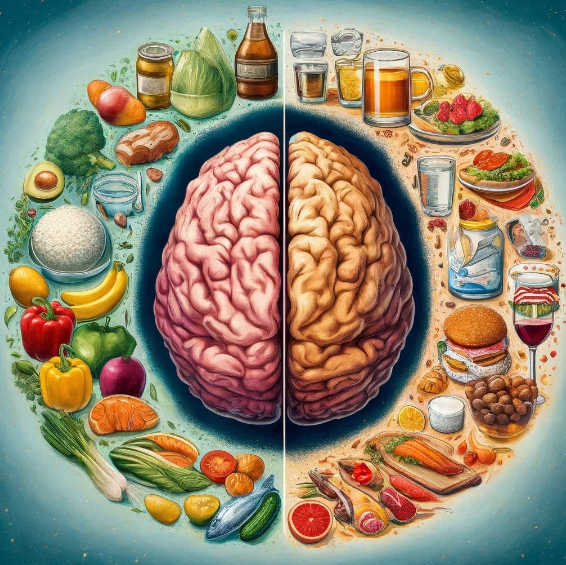Introduction: Understanding the Connection Between Nutrition and Mental Health
Nutrition plays a vital role in our overall health, influencing not only our physical well-being but also our mental health. With an increasing focus on mental wellness, understanding the impact of diet on mood, cognition, and emotional well-being has become essential. This article explores how nutrition affects mental health, identifies key nutrients that support brain function, and provides practical dietary tips for enhancing mental well-being.
The Brain-Gut Connection
- How Nutrition Affects the Brain The brain requires a variety of nutrients to function optimally. Diet influences brain structure and function, including neurotransmitter production, inflammation levels, and overall cognitive performance.
- The Gut-Brain Axis The gut and brain communicate through a complex network known as the gut-brain axis. Gut health significantly affects mental health, as beneficial gut bacteria can influence neurotransmitter production and inflammation, both critical for emotional regulation.
Key Nutrients for Mental Health
- Omega-3 Fatty Acids
- Sources: Fatty fish (salmon, mackerel), flaxseeds, walnuts.
- Benefits: Omega-3 fatty acids are crucial for brain health, associated with reduced symptoms of depression and anxiety, and improved cognitive function.
- B Vitamins
- Sources: Whole grains, eggs, dairy products, leafy greens, legumes.
- Benefits: B vitamins, especially B6, B12, and folate, are essential for neurotransmitter synthesis. Deficiencies in these vitamins can lead to mood disorders.
- Antioxidants
- Sources: Fruits (berries, oranges), vegetables (spinach, kale), nuts, and seeds.
- Benefits: Antioxidants combat oxidative stress, which can negatively impact brain health and contribute to anxiety and depression.
- Amino Acids
- Sources: Meat, fish, dairy, legumes, nuts.
- Benefits: Amino acids are the building blocks of neurotransmitters. For example, tryptophan is a precursor to serotonin, a key neurotransmitter involved in mood regulation.
- Vitamin D
- Sources: Sunlight exposure, fortified foods, fatty fish, egg yolks.
- Benefits: Vitamin D deficiency has been linked to an increased risk of depression and cognitive decline. Adequate levels are essential for mood stabilization.
Foods to Support Mental Health
- Fruits and Vegetables Aim for a colorful variety to maximize nutrient intake. Berries, leafy greens, and citrus fruits are particularly beneficial for brain health.
- Whole Grains Incorporate whole grains like brown rice, quinoa, and oats to provide a steady source of energy and support stable blood sugar levels.
- Lean Proteins Include sources of lean protein such as poultry, fish, beans, and legumes to supply essential amino acids for neurotransmitter production.
- Healthy Fats Focus on healthy fats from sources like olive oil, avocados, and nuts to support brain function and reduce inflammation.
- Fermented Foods Include yogurt, kefir, sauerkraut, and kimchi in your diet to promote a healthy gut microbiome, which is essential for mental health.
Practical Tips for a Brain-Boosting Diet
- Eat a Balanced Diet Aim for a diverse diet rich in whole foods, emphasizing fruits, vegetables, whole grains, lean proteins, and healthy fats.
- Stay Hydrated Dehydration can impair cognitive function and mood. Aim to drink plenty of water throughout the day.
- Limit Processed Foods Reduce intake of processed foods high in sugar, unhealthy fats, and additives, which can negatively affect mental health.
- Practice Mindful Eating Engage in mindful eating by paying attention to hunger cues and savoring each bite, promoting a healthier relationship with food.
- Plan Meals Ahead Preparing meals in advance can help ensure a balanced diet and reduce reliance on unhealthy convenience foods during busy times.
Conclusion: Nourishing the Mind for Better Mental Health
Nutrition plays a crucial role in mental health, and making informed dietary choices can enhance overall well-being. By focusing on nutrient-dense foods and maintaining a balanced diet, individuals can support their mental health and foster a positive mindset. As research continues to highlight the connection between nutrition and mental well-being, it becomes increasingly clear that what we eat significantly impacts how we feel.
Sources:
- Holscher, H. D. “Dietary Fiber and Prebiotics and the Gastrointestinal Microbiota.” Gut Microbes, vol. 6, no. 3, 2015, pp. 218-224.
- Jacka, F. N., et al. “A Randomized Controlled Trial of Dietary Improvement for Adults with Major Depression (the SMILES Trial).” BMC Psychiatry, vol. 18, no. 1, 2018, pp. 1-12.
- Sarris, J., et al. “Nutritional Psychiatry: The Role of Diet in Mental Health.” Journal of Psychiatry and Neuroscience, vol. 41, no. 5, 2016, pp. 296-305.
- Pottgen, C., et al. “The Impact of Diet on Mental Health: A Review.” Current Opinion in Psychiatry, vol. 33, no. 6, 2020, pp. 583-588.
- Li, Y., et al. “Dietary Patterns and Depression: A Review.” Current Nutrition Reports, vol. 5, no. 4, 2016, pp. 411-419.

